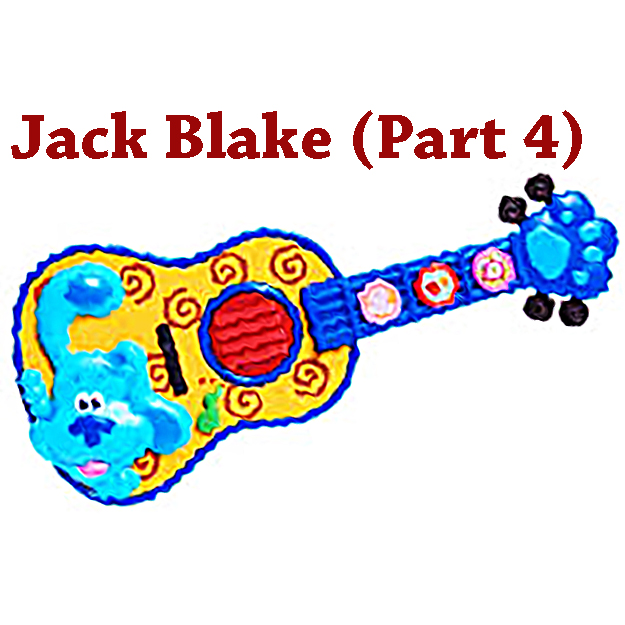Jack Blake: A True Rock and Roll Tale (Part 4)
It was getting late and I stood up to leave when Jack said, “Where are you going? It’s time to record.”
I sat back down. As I surveyed the interior, Jack started hauling out his recording equipment and setting up. Finally 30 minutes after plugging in, tuning, testing, Jack was ready to record. I slumped in a bean bag chair with a can of beer and watched Jack perform. Mr. Figgs roused from his snooze and came over and sat in his own bean bag chair to watch the show.
A show? That is a vast, vast, understatement. What I witnessed over the course of the next two hours surely must rank with one of the greatest and bizarre performances in the history of American music.
Jack opened with a Fats Waller tune and then ran through several Negro spirituals. Next a 10-part double fugue. Then it was a sea song called “The Greenland Whale Fishery,” a few examples of skiffle, an early, obscure Bob Marley composition, a Depression era song titled “How Can a Poor Man Such Times and Live?”, a medley of Latin American hits (sung in Spanish), a bootlegging classic called “Good Ole’ Mountain Dew,” a Turkish instrumental, a few lusty Goliardic songs (in Latin) from the 13th century that Jack especially loved because they were often performed by wandering defrocked priests or runaway monks, and finally, two snippets of traditional Javanase mountain music.
Jack typically ripped through the tracks once, singing and playing various guitars, acoustic and electric, then madly overdubbed them with instruments or vocals while listening through a tiny mono speaker. During this session I never once saw him start an overdub and then stop. I asked him about this and told me he never stops during this process. It’s all one take and move on.
After a rowdy cover of a Stevie Wonder song, “Master Blaster,” Jack stopped for a minute, took a swig off his beer, gargled and then launched into five minutes of Tuvan throat singing, a bizarre sounding vocal technique indigenous to a remote area in Central Asia. He accompanied it with a wicked slide guitar and together it formed the most intense, strange and utterly rockin’ music I had ever heard.
Jack wrapped up the recording session, popped out the cassette tape, scribbles some words on the tape and its case with a marker and set it aside.
It was somewhere around this point, well into the early morning, that Jack discovered I worshiped the Stones. He insisted we record a few tunes together and we set to work cutting “Stop Breaking Down,” “Dear Doctor,” and “Rocks Off.” I sang background vocals and bashed the tambourine. Jack put down a wicked, driving banjo solo on “Rocks Off” and then ended our jam on a plaintive waltz pace. When we concluded, he turned off the recorder and marked the tape as he had the previous one and handed it to me.
It was 4:30 in the morning and I took the tape and staggered drunk and awestruck to my rig.
The next morning, we woke up shattered. Jack threw together a scrambled egg and toast breakfast that instantly revived us and we talked about books. He certainly favored the serious literature: Melville, Dos Passos, London, Tolstoy, Yeats, Dickinson, Alice Munro, and many others. I asked if I could peruse his library while he cleaned up after breakfast. He said sure.
All were battered library rejects and I as leafed through several of the volumes, I noticed Jack had heavily annotated them with comments, questions, and lines of verse. Jack also owned many atlases and non-fiction books, almost exclusively about the Northwest: natural history, labor history, politics, outdoor adventure, textbooks, travel guides and so on. As I read a passage from a book about the Wobblies who worked in the Oregon timber industry, Jack broke my concentration by asking me to find the WPA American Guide to Oregon, one of the famous travel/cultural guides to American life produced by the Federal Writers Project during the Depression.
He told me owned all the guides to Western states and used only them for his road maps, camping and cultural/historical information. These guides were written before the federal interstate highway system was constructed in the 50s and the unfortunate idea of national hotel/motel chains.
Breakfast was over and I was about ready to leave when Jack asked me if I wanted to accompany him to his storage unit in Coos Bay. He said he needed to drop off some cassettes and change out some of his musical equipment.
Of course I would go with him.
An hour later, “Pequod” was on the road and Jack had a Dolly Parton 8-track playing. Mr. Figgs was riding shotgun and I sat back in a bean bag wondering how I was going to tell this story. I didn’t know yet because I didn’t know what the story was.

